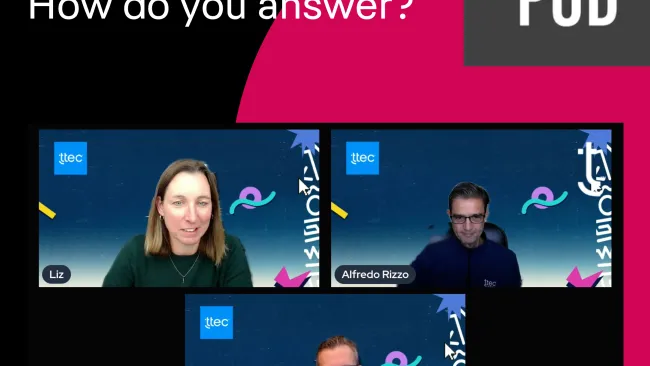Life is complicated and rarely goes as planned and 2020 was no exception, especially for healthcare. COVID-19 triggered waves of individuals and families looking for help and answers, well beyond planned contact center volume levels.
Handling volume spikes in support with a genuine, human experience can help organizations run more efficiently and provide better experiences. As the vaccination begins its rollout, here are 3 ways healthcare organizations can support large contact volumes immediately.
1. Put flexible operations into action
It will be essential to retain the incredible talents of at-home associates to augment support during surges. The ability to flexibly ramp up or down quickly with skilled associates increases your ability to meet service levels and deliver amazing experiences.
Deploy a network of digitally enabled, remote contact center staff with the technology and tools to be ready to spring into action to support sudden volumes. The combination of technology with people offers automated answers for the easy questions and opens humans up to handle the issues that demand empathy and understanding.
Equip agents with an omnichannel, cloud-based CX infrastructure that enables and integrates digital tools like text messaging and live chat to deflect calls and scale as needed when the questions come (vaccination and beyond.)
For example, when a leading national pharmacy retailer anticipated an enormous surge in customer volume, the company needed a reliable partner that could help it quickly ramp and expand its customer support and assist with scheduling, with well-trained, experienced associates. Our talent acquisition teams quickly mobilized to recruit in multiple geographies and onboard nearly 500 at-home associates to answer questions from callers about the COVID-19 vaccine, where to get it, what to expect, and more.
We ultimately ramped 650 associates in less than 4 weeks (the client requested an additional 150 associates as we were ramping). The project is ongoing and the associates are prepared to answer a wide range of questions from “am I eligible to receive the COVID-19 vaccine” to “which vaccines are offered, are they safe,” and many other questions.
2. Be proactive, be ready
Appointment setting, second dose planning, and follow ups will be conducted on a massive scale. Proactive outreach won’t be a nice to have, it will be a necessity for how healthcare succeeds today and tomorrow.
Agents can achieve this by interacting with patients on channels they use, such as Facebook Messenger or SMS messaging. Digital tools like asynchronous messaging can provide information and communication directly, so patients are likely to receive and pay attention to the conversation.
In the past, The Center for Medicare and Medicaid Services (CMS) encouraged health insurers to help their enrollees, providers, and the larger community understand the importance of vaccination. Continue this trend of communication and education by remaining to be relevant and available to patients.
When a major healthcare organization at the onset of the pandemic needed to connect individuals to social assistance programs and community resources we recruited, trained, and ramped a team of nearly 20 care associates who worked remotely to assess members’ needs. Agents could deliver information to members via text, email, or over the phone. If a first call resolution wasn’t possible, the agents followed up with a second call in addition to locating applicable resources and providing assistance until the resolution was made.
3. Train in empathy, deploy with action
Training is always important when talking about emergency-related surges. Assistance during these tense, emotionally driven conversations needs to be met with associates who are ready to hit the ground running with relevant knowledge and information. We’ve identified opportunities for improvement and innovation in training with real-time coaching.
Our award-winning RealPlay Bot leverages AI training associates can use to simulate scenarios for real-time practice, assessment, and coaching. Associates can utilize it remotely, more training can be done with fewer resources, and the practice simulations encourage better information retention.
Using bots to provide asynchronous practice, consistent feedback, and personalized coaching, provides opportunities to rapidly train new associates by supplying interactive training that lets them practice and identify areas that need improvement. This will be crucial for constantly evolving events such as the vaccine rollout that requires flexible and knowledgeable assistance on the go.
Face customer surges head on
Changing the mindset is critical in an emergency or surge-related event to figure out how to optimize conversations, channel usage, and training. In a surge-related events empathy is a requirement, but it needs to match with the right technology to provide help whenever, wherever.














